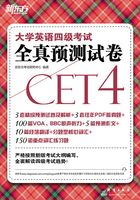
Part II Listening Comprehension (25 minutes)
Section A
Directions: In this section, you will hear three news reports. At the end of each news report, you will hear two or three questions. Both the news report and the questions will be spoken only once. After you hear a question, you must choose the best answer from the four choices marked A), B), C)and D). Then mark the corresponding letter on Answer Sheet 1 with a single line through the centre.
Questions 1 and 2 are based on the news report you have just heard.
1.A) Christmas-time attacks made by Somali rebels.
B) An explosion at a bus station in central Nairobi.
C) The killing of more than 70 Ugandans in Kampala.
D) Blasts set off by a Somali group in Uganda's capital.
2.A) On Christmas Eve.
B) Just before midnight.
C) During a security check.
D) In the small hours of the morning.
Questions 3 and 4 are based on the news report you have just heard.
3.A) It is likely to close many of its stores.
B) It is known for the quality of its goods.
C) It remains competitive in the recession.
D) It will expand its online retail business.
4.A) Expand its business beyond groceries.
B) Fire 25,000 of its current employees.
C) Cut its DVD publishing business.
D) Sell the business for one pound.
Questions 5 to 7 are based on the news report you have just heard.
5.A) All taxis began to use meters.
B) All taxis got air conditioning.
C) Advertisements were allowed on taxis.
D) Old taxis were replaced with new cabs.
6.A) A low interest loan scheme.
B) Environmentalists' protests.
C) Taxi passengers' complaints.
D) Permission for car advertising.
7.A) There are no more irregular practices.
B) All new cabs provide air-conditioning.
C) New cabs are all equipped with meters.
D) New legislation protects consumer rights.
Section B
Directions: In this section, you will hear two long conversations. At the end of each conversation, you will hear four questions. Both the conversation and the questions will be spoken only once. After you hear a question, you must choose the best answer from the four choices marked A), B), C)and D). Then mark the corresponding letter on Answer Sheet 1 with a single line through the centre.
Questions 8 to 11 are based on the conversation you have just heard.
8.A) She is hard-working.
B) She has to catch an early bus.
C) She is busy in the morning.
D) She gets up late in the morning.
9.A) It's better than evening exercise.
B) It helps him work more efficiently.
C) Young people do not need to take exercise.
D) Morning exercise is generally informative.
10.A) He has to go to parties in the evening.
B) He has to prepare dinner for the family.
C) The air is not fresh in the evening.
D) He can't afford the time.
11.A) Go home.
B) Go to his office.
C) Go to the bus stop.
D) Send his son to school.
Questions 12 to 15 are based on the conversation you have just heard.
12.A) Colorado.
B) Arizona.
C) The Nile River.
D) The Museum of Natural History.
13.A) Archaeological.
B) Biological.
C) Meteorological.
D) Sociological.
14.A) In a cave.
B) In a river.
C) In a tree.
D) In a boat.
15.A) Solve a mystery.
B) See the canyon.
C) Find some driftwood.
D) Take some photographs.
Section C
Directions: In this section, you will hear three passages. At the end of each passage, you will hear three or four questions. Both the passage and the questions will be spoken only once. After you hear a question, you must choose the best answer from the four choices marked A), B), C)and D). Then mark the corresponding letter on Answer Sheet 1 with a single line through the centre.
Questions 16 to 18 are based on the passage you have just heard.
16.A) The head of the Alumni Office.
B) A doctor.
C) A professor of business administration.
D) A student from last year's program.
17.A) Medical interns.
B) Undergraduate students.
C) Local business executives.
D) Alumni sponsors.
18.A) They give money to sponsor the program.
B) They write letters of recommendation.
C) They provide job opportunities.
D) They work for the Alumni Office.
Questions 19 to 22 are based on the passage you have just heard.
19.A) To give background information about Santa Catalina Island.
B) To tell the audience about new books on Santa Catalina.
C) To introduce a training film on baseball.
D) To tell people about the music from the 1930s and 1940s.
20.A) A bandleader.
B) A wealthy businessman.
C) An early settler of Santa Catalina.
D) A baseball player from Chicago.
21.A) To set up an exclusive resort.
B) To build a marina.
C) To establish a summer retreat for musicians.
D) To start a training camp for a baseball team.
22.A) Traditional Portuguese music.
B) Opera.
C) Big-band music.
D) Music composed by Wrigley.
Questions 23 to 25 are based on the passage you have just heard.
23.A) Recalling something from one's memory.
B) The preparatory method in exams.
C) Conscience.
D) Man's mind.
24.A) From the ones they are familiar with to the difficult ones.
B) From the short ones to the long ones.
C) From the complicated ones to the easy ones.
D) From the ones they are confident of to the more difficult ones.
25.A) When you can't recall something instantly, you should try your best to do it.
B) When you can't recall something instantly, you'd better have an operation on your mind.
C) The subconscious activities may go to work to dig up a dim memory.
D) Forcing yourself to recall may loosen your memory.